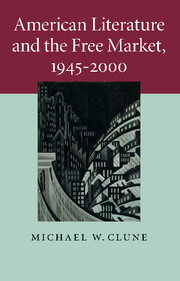Book contents
- Frontmatter
- Contents
- Acknowledgements
- List of abbreviations
- Introduction: The economic fiction
- 1 Freedom from you
- 2 Frank O'Hara and free choice
- 3 William Burroughs' virtual mind
- 4 Blood money: sovereignty and exchange in Kathy Acker
- 5 “You can't see me”: rap, money, and the first person
- Conclusion: The invisible world
- Notes
- Bibliography
- Index
Conclusion: The invisible world
Published online by Cambridge University Press: 23 February 2010
- Frontmatter
- Contents
- Acknowledgements
- List of abbreviations
- Introduction: The economic fiction
- 1 Freedom from you
- 2 Frank O'Hara and free choice
- 3 William Burroughs' virtual mind
- 4 Blood money: sovereignty and exchange in Kathy Acker
- 5 “You can't see me”: rap, money, and the first person
- Conclusion: The invisible world
- Notes
- Bibliography
- Index
Summary
In the preceding chapters I have attempted to show how, in a set of postwar literary works, the aesthetic disembeds the economic from social relations grounded in recognition. Using a variety of techniques, these works remove the economic from what Hannah Arendt calls the “public world,” the social space where visibility confers reality. This removal transforms the market in basic ways. Instead of a social structure facilitating the mutual recognition of individuals, or mediating between the different desires of individuals, the economic becomes a means of shaping and organizing individuals' experience of the world. The economic relations at work in the aesthetic spaces I study present an alternative to the regime of recognition, the regime of the social, the regime of the visible. The fiction of this invisible economy opens the fascinating prospect of a new mode of experience.
In discussing these works, I have been primarily concerned with delineating the internal dynamics of the aesthetic spaces they set up. Sometimes an attention to the cultural and political contexts in which the writers worked has helped to clarify the distinctive shape of these dynamics. But while describing the features of this phenomenon, I have largely bracketed the question of the relation of the economic fiction to existing social and economic conditions. Having completed the description, my conclusion now takes up this question. I address it in two parts. First, I will investigate the hypothesis that economic fictions perform the ideological function of concealing actual economic inequality.
- Type
- Chapter
- Information
- American Literature and the Free Market, 1945–2000 , pp. 147 - 164Publisher: Cambridge University PressPrint publication year: 2009

